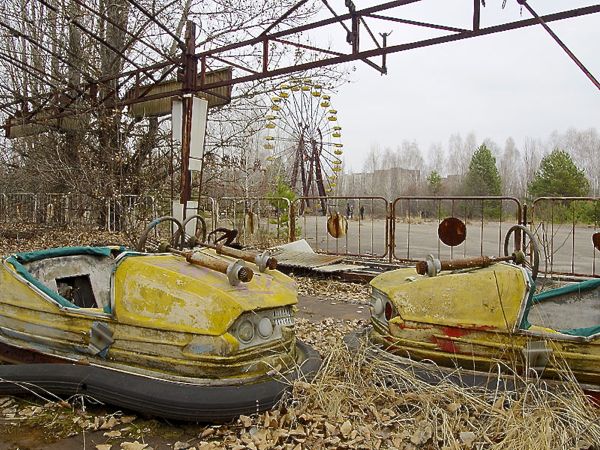Pripyat (Ukrainian: При́п’ять, Prýp’jat′; Russian: При́пять, Prípyat′
Pronunciation) is an abandoned city in northern Ukraine, near the border with Belarus.
Named after the nearby Pripyat River, Pripyat was founded on 4 February 1970, the ninth nuclear city in the Soviet Union, to serve the nearby Chernobyl Nuclear Power Plant.[2] It was officially proclaimed a city in 1979, and had grown to a population of 49,360[3] by the time it was evacuated, a few days after the 26 April 1986 Chernobyl disaster. ~~~ Wiki
To bookend these stunning photographs – which depict similar disasters and provide stark illustrations of the collapse of civilization, just at different rates – let me just present the Foreword to Neil Postman’s 1985 prescient book Amusing Ourselves To Death – Public Discsourse In The Age of Show-Business:
We were keeping our eye on 1984. When the year came and the prophecy didn’t, thoughtful Americans sang softly in praise of themselves. The roots of liberal democracy had held. Wherever else the terror had happened, we, at least, had not been visited by Orwellian nightmares.
But we had forgotten that alongside Orwell’s dark vision, there was another – slightly older, slightly less well known, equally chilling: Aldous Huxley’s Brave New World.Contrary to common belief even among the educated, Huxley and Orwell did not prophesy the same thing. Orwell warns that we will be overcome by an externally imposed oppression. But in Huxley’s vision, no Big Brother is required to deprive people of their autonomy, maturity and history. As he saw it, people will come to love their oppression, to adore the technologies that undo their capacities to think.
What Orwell feared were those who would ban books. What Huxley feared was that there would be no reason to ban a book, for there would be no one who wanted to read one. Orwell feared those who would deprive us of information. Huxley feared those who would give us so much that we would be reduced to passivity and egoism. Orwell feared that the truth would be concealed from us. Huxley feared the truth would be drowned in a sea of irrelevance. Orwell feared we would become a captive culture. Huxley feared we would become a trivial culture, preoccupied with some equivalent of the feelies, the orgy porgy, and the centrifugal bumblepuppy. As Huxley remarked in Brave New World Revisited, the civil libertarians and rationalists who are ever on the alert to oppose tyranny “failed to take into account man’s almost infinite appetite for distractions”. In 1984, Huxley added, people are controlled by inflicting pain. In Brave New World, they are controlled by inflicting pleasure. In short, Orwell feared that what we hate will ruin us. Huxley feared that what we love will ruin us.
This book is about the possibility that Huxley, not Orwell, was right.
While I think Huxley was right, I certainly don’t think Orwell was wrong.



Pingback: WolfeNotes.com » Bulls Island Remains Closed For The Sixth Year